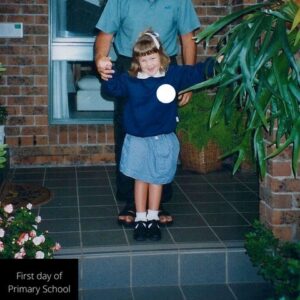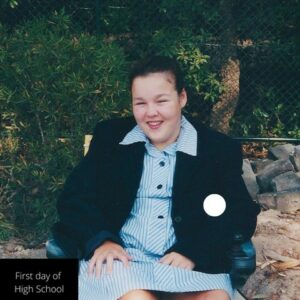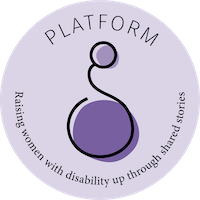Platform Stories is my opportunity to showcase and support other woman with disability, and creating each piece refreshes me. I feel more like part of a collective, part of a groundswell of change on how people living with disability are seen as all that we are… capable, dynamic, individual, human, amazing, vulnerable, and I am always reminded that we are all in this together. Sharing stories in this way reinforces that change is possible, and that we have a lot more momentum and influence when we do it together, each in our own way but connected through a common goal.
The latest Storyteller on the Platform, Peta Hooke is a kindred spirit, funny, warm, and open. She made me smile and laugh, as we chatted about our lives, our goals and how she is working to open up discussion about living with a disability and clarify what it means to live, as she does, with Cerebral Palsy.
Let me introduce you to Peta..
Tell us about yourself
Hi! I’m Peta I am a disability advocate and podcaster. I am born and bred in Melbourne (yes I am a bit stereotypical in my love for coffee) and I am 31.
What has been your journey of disability?
A year or so ago I would have said it was a fairly straightforward ‘journey’ with my disability. Since changing my life, choosing the scary and starting my own business I now see my past a bit differently.
I have always had a disability, being born with Cerebral Palsy, but when I was younger I saw it as a separate entity to myself.
Now I am very proud to say that I am disabled and it is nothing to be ashamed of, internalised ableism is very real, I am discovering.
Intellectually I know in childhood and during my teenage years, my approach to my disability was to fit into the mainstream. My biggest fear was to be ‘othered’, not accepted or not included because of something I couldn’t change or had any control of.
For me, my approach to ignoring my disability during this time was the right decision. I have never really been bullied, I have always had a big group of friends and I achieved enough academically to get into university.
Now I am proud of who I am, in its entirety. I believe having a disability has made me a better person and I am very passionate about helping people without disabilities understand what it is like to live with a disability. Without understanding, equality will not happen.


Was there a specific moment that led you to begin to advocate in a very public way?
There are two moments.
One was being a part of the “Voices from the chair” campaign which I was asked to be a part of, five years ago. The response to my work for that small campaign I found to be very fulfiling.
I saw the “Voices from the chair” campaign to be a stepping stone to getting into the Accessible Tourism space. By illustrating that people with disabilities do and can engage in the community as a consequence they also engage in the tourism industry.
The second was sitting at my desk on a Wednesday talking about an awful experience I had, had with a supposedly disability-inclusive business to my boss.
My boss said to me “Peta what are you doing? You have to use your voice and help change people’s understanding of people with disabilities”.
My boss didn’t know at the time that I had been thinking about starting a podcast for months. That one sentence changed my life. I knew that I couldn’t live in this world and be continually underestimated because of my disability. By her saying that to me, gave me the permission to let myself think about a bigger life.
“I knew that I couldn’t live in this world and be continually underestimated because of my disability”
Can you tell us about your podcast The I Can’t Stand Podcast?
The I Can’t Stand Podcast is a weekly podcast answering one question, from my audience, about what it is like to live with a disability. Most of my episodes are bite-sized, between 10 and 15 minutes, making them easy for the audience to consume. It is very important to me that they don’t get intimidated by the topics I discuss. I aim to be the friend in their ears talking to them over a coffee or a G and T.
I am also starting to expand the podcast to highlight other voices in the disability community. I am very aware that I am just one person, with one disability and I want to make sure that the podcast illustrates what it is like to live with a disability for many people rather than just me.
My podcast can be found on all podcasting platforms including, Apple Podcasts, Google Podcasts and Spotify.


Why is being an advocate in this way important to you?
Almost every day I see examples of the inequality that people with disabilities experience. Whether it be in person or online until we are considered valuable members of society I don’t see any other alternative than to advocate for inclusion.
What is the most important message you hope to spread via your advocacy roles?
That people with disabilities are just like you. We might communicate differently, use mobility aids or have different needs but that doesn’t mean we don’t deserve the same opportunities in life as non-disabled people expect and experience.

Is there anything that you find challenging about sharing your stories in this way?
I find it hard to know when to stop. I need to improve my work-life balance. I am so determined to help other people and for the podcast to be a success I seem to be working all day every day.
What is the most rewarding aspect of doing so?
For me, it is receiving messages from people saying they are enjoying my content or I’ve made them think of living with a disability differently.
You spend some of your time as a public speaker, can you tell us what your messages are?
People with disabilities are just like you. We have lives, friends and ambitions to live a fulfilling life.
Without being willing to engage in conversations that might be uncomfortable and have the hard conversations understanding will never happen. In my opinion, without understanding equality is impossible.
Are there things about you that people misunderstand because of your disability?
Let me set the scene, let’s say I am at a friends house for a birthday, or a baby shower or just a bbq, strangers reactions to my attendance is very telling. In those contexts, I’ve been asked if I finished high school ( I have a Masters Degree) if I work ( I do, very hard) and how my parents feel about me being out ( I own my own home and I’m 31. my parents are no different to any other parents who have children in their thirties).
Basically, I have found that regardless of a persons’ background, race and education, the lack of understanding of how ‘normal’ my life is, continues to astound me.
“I have found that regardless of a persons’ background, race and education, the lack of understanding of how ‘normal’ my life is, continues to astound me”
What is one thing, experience or person you have had that completely changed your life?
The conversation I had with my boss at the time, see above.
Is there a single piece (or more!) of technology that makes your life easier? Why?
There are so many.
My ceiling hoist helps me live independently. It is the only way I can get in and out of bed, use the toilet, have a shower and get in my wheelchair.
My Wheelchair helps me live. I can’t walk, transfer or stand. I am not myself without my chair.
My accessible home. I can do the washing, cook in my kitchen, work from home, even do something simple like make a cup of tea. It is invaluable to living the life I want. I know I am very privileged and I count my lucky stars for it every day.
My converted car. I can drive sitting in my wheelchair and drive where ever I need to in an efficient timely and safe manner. Something I don’t take for granted as I have had a few very poor experiences in taxis, trams and trains. I feel very lucky to not have to solely rely on those services.
Knowing what you know now, what advice would you give your 18-year-old self?
I would keep my advice very vague. I feel if I had known how difficult my 20s were going to be I don’t think I would have coped as well as I did. Ignorance is bliss don’t they say?
All I would say is hang on tight, your life will be a rollercoaster just try and enjoy the ride.

Is there something that you would like people to know about you or about people with disabilities that they might not know?
I would like people to know that for me and many people, the disability itself isn’t the hard bit. Often I struggle the most after facing ignorance and discrimination when in the community.
The best advice that you would like to share with other women with disabilities?
I am still very much feel like a newbie in the disability community. I am learning about the reality of disability for other people. I by no means have all the answers I just want to help.
At the moment instead of offering advice, I would prefer for us all to meet for margaritas and have the best girls night. Learning from each other, listening to each other and feeling joy. Such a cliche but since Covid, I look forward to experiencing cliches again.
Do you have a way for people to connect or follow you that you would like me to share? (Instagram handle etc)
The I Can’t Stand Podcast can be found on all platforms including Apple Podcasts, Google Podcasts and Spotify.
Also, I am very proud of my Instagram community. You can join Peta’s community @petahooke


